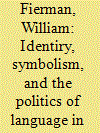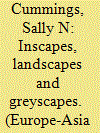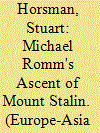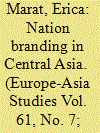|
|
|
Sort Order |
|
|
|
Items / Page
|
|
|
|
|
|
|
| Srl | Item |
| 1 |
ID:
090577


|
|
|
|
|
| Publication |
2009.
|
| Summary/Abstract |
Drawing on field research conducted between 2002 and 2008, including interviews with leading Turkmen 'court' artists and sculptors, personal observation of official events, and analysis of regime texts, this essay seeks to explore the intersections between official history, commemorative strategy, community memory, public sculpture and geopolitics in post-Soviet Turkmenistan. An illuminating example of this interplay is the commemoration and symbolisation of the Great Patriotic War, which has presented a complex challenge to authorised renditions of Turkmen identity, requiring the country's post-Soviet elites to devise new strategies, symbols and vocabularies to direct and accommodate, somewhat ineffectually, popular remembrance practices and the fleeting public visibility of the country's ethnic Russian minority.
|
|
|
|
|
|
|
|
|
|
|
|
|
|
|
|
| 2 |
ID:
090580


|
|
|
|
|
| Publication |
2009.
|
| Summary/Abstract |
This article is devoted to the symbolic aspects of language and power in the four Turkic-speaking republics of Central Asia-Kazakhstan, Kyrgyzstan, Turkmenistan and Uzbekistan. Much of the discussion will analyse what I will refer to as 'reference points' of identity represented in language. These include 'Islam', 'Turkic-ness', 'Persian culture', 'nationality', and two 'international' reference points-'world international' and 'Soviet international'. In the very first years after the Bolshevik Revolution, 'international' referred to parts of the world beyond the former Russian Empire, especially the industrial states of Western Europe. In the 1930s, however, 'international' came to mean the USSR, and in particular, Russia. In the post-Soviet world, 'international' is once again acquiring a much broader and more global meaning.
|
|
|
|
|
|
|
|
|
|
|
|
|
|
|
|
| 3 |
ID:
090572


|
|
|
|
|
| Publication |
2009.
|
| Summary/Abstract |
Differences in the strategies and fates of signification confirm that the blanket label of authoritarianism, if correctly applied to the regimes in Central Asia, covers very different state-society relations and styles of government. Depending on which function type we focus on, symbols can predict regime development-and even, in some authors' views, collapse. With the exception of branding (more referential and often devoid of meaningful content), symbols often convey meaning about domestic self-images and politics that cut-and-thrust political bargaining may not. In each of the five Central Asian politics, they give a sense of the bigger picture, of what the stakes are about, about what aspects of collective identity matter or have ceased to matter. Different regimes of power have produced different regimes (structures and practices) of meaning.
|
|
|
|
|
|
|
|
|
|
|
|
|
|
|
|
| 4 |
ID:
090581


|
|
|
|
|
| Publication |
2009.
|
| Summary/Abstract |
This article addresses the puzzle of why the leaders of Kyrgyzstan, a country beset by one economic or political crisis after another over the nearly two decades since independence, have devoted considerable attention to things like sheep bones, mythical heroes, slogans and flags. What has it all been about?
|
|
|
|
|
|
|
|
|
|
|
|
|
|
|
|
| 5 |
ID:
090573


|
|
|
|
|
| Publication |
2009.
|
| Summary/Abstract |
This essay engages with the dilemma of legitimisation of authoritarian states that move away from democracy by examining the cases of the Central Asian countries. These states have consolidated their independence since 1991, despite continuous internal tensions, and have withstood the impact of their turbulent neighbourhood. Achieving a degree of 'legitimacy' which fosters compliance with the existing domestic order, has made the rule of the current leaderships easier and has reduced the pressure on them to simply rely on coercion. Nevertheless, underlying challenges remain and will only grow in significance as these states struggle to balance the construction of state identities, elite cohesion and international recognition with the maintenance of some degree of internal legitimacy.
|
|
|
|
|
|
|
|
|
|
|
|
|
|
|
|
| 6 |
ID:
090582


|
|
|
|
|
| Publication |
2009.
|
| Summary/Abstract |
In this article we explore this relationship between state and population that Michel Foucault (1991) termed governmentality, in order to highlight what we find to be important differences between the two countries that larger political analyses might overlook. We do not attempt to theorise or explain as much as we seek to interpret the differences, sometimes subtle and sometimes not, in what techniques and practices are enacted, what forms of knowledge are produced, and what kinds of subjects are constituted in each country.
|
|
|
|
|
|
|
|
|
|
|
|
|
|
|
|
| 7 |
ID:
090583


|
|
|
|
|
| Publication |
2009.
|
| Summary/Abstract |
This essay is concerned with the materiality of state space in a rural region of post-Soviet borderland. It examines the institutional forms and mundane practices through which a juridical boundary between Kyrgyzstan and Tajikistan is materialised; the work involved in inscribing territoriality (Gupta & Ferguson 1997, p. 40), and the social consequences of these interventions. Such processes, it argues, are more extensive, complex and disjointed than the mounting of barbed wire or the building of border posts. Territorialising the state is never merely a technical exercise; it is disparate, contentious, temporally extensive, symbolically loaded and, as Kyrgyzstan's recent past has shown, politically consequential. 1 The intense political and material investment that is entailed in producing 'territorial integrity' is particularly striking in the area of the Kyrgyzstan-Tajikistan borderland in the Isfara valley that is the focus of concern here: a region where borders have historically been of little popular relevance and where they remain poorly demarcated and weakly institutionalised.
|
|
|
|
|
|
|
|
|
|
|
|
|
|
|
|
| 8 |
ID:
090576


|
|
|
|
|
| Publication |
2009.
|
| Summary/Abstract |
This article will focus on the 1936 English language edition of The Ascent of Mount Stalin (Ascent hereafter). Ascent provides a firsthand account of the planning and progress of the expedition, the climbing of Mount Stalin, and the physical and human landscape in which it took place. The expedition was a major scientific and mountaineering event, which involved leading Soviet scientific and political figures. Mount Stalin was the highest point in the USSR and the highest outside of the Himalayas to have been climbed at the time.
|
|
|
|
|
|
|
|
|
|
|
|
|
|
|
|
| 9 |
ID:
090574


|
|
|
|
|
| Publication |
2009.
|
| Summary/Abstract |
This essay examines the national images that Central Asian states are trying to present to international audiences. Since 1991 all Central Asian states have created national ideologies, but only three-Kazakhstan, Kyrgyzstan and Uzbekistan-have programmes in place to capture the attention of foreign businessmen, politicians and tourists. Following the pattern of crafting national ideologies for domestic audiences in all three states, the ruling elites have led the effort to create a unique national 'brand' identity for their country.
|
|
|
|
|
|
|
|
|
|
|
|
|
|
|
|
| 10 |
ID:
090579


|
|
|
|
|
| Publication |
2009.
|
| Summary/Abstract |
Programmes of educational reform in Central Asian societies-as in many other societies across the globe-are often presumed to be either reflections of dominant political and economic change or tools for achieving it. In this essay, which uses higher education reform in Kyrgyzstan as a case study for theoretical analysis, I argue for an alternative, more constructivist interpretation of the relationship between education and the political. This is that educational work is a key site for the articulation of social imaginaries and for defining the cultural and political practices through which they may legitimately be realised.
|
|
|
|
|
|
|
|
|
|
|
|
|
|
|
|
| 11 |
ID:
090575


|
|
|
|
|
| Publication |
2009.
|
| Summary/Abstract |
For any student of Soviet politics, Uzbekistan's Kamalot youth organisation is immediately familiar. Modelled after the Soviet Komsomol, Kamalot is designed to capture the hearts and minds of Uzbekistan's burgeoning youth population. It may be trite to conclude a country's youth is its future. Nowhere in Central Asia, though, is this more the case than in Uzbekistan. In 2015, 47% of Uzbekistan's population will have been born after the Soviet collapse.
|
|
|
|
|
|
|
|
|
|
|
|
|
|
|
|
| 12 |
ID:
090584


|
|
|
|
|
| Publication |
2009.
|
| Summary/Abstract |
Tajikistan's peace is symbolic not just in that it conceals an alternative reality but in that its symbols often indicate the absence of the object which they ostensibly represent-and the presence of its antonym. These signs are constructive of the kind of peace that has emerged in Tajikistan over the last decade and a half. Yet, as this essay has demonstrated interpretively, symbolic politics in Tajikistan is in some respects enveloped by a virtual politics of peace and peacebuilding where such a rendering of presence and absence is illusive. This substitution of an object's fixed meaning by shifting markers which develop a life of their own is an inherent ambiguity found in signs of international peacebuilding and national stabilisation.
|
|
|
|
|
|
|
|
|
|
|
|
|
|
|
|
|
|
|
|
|